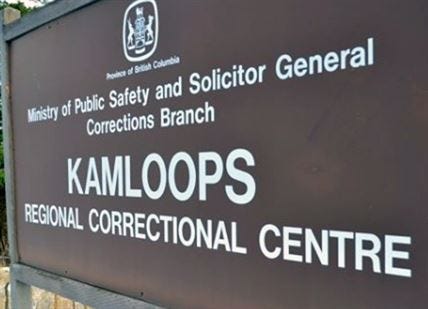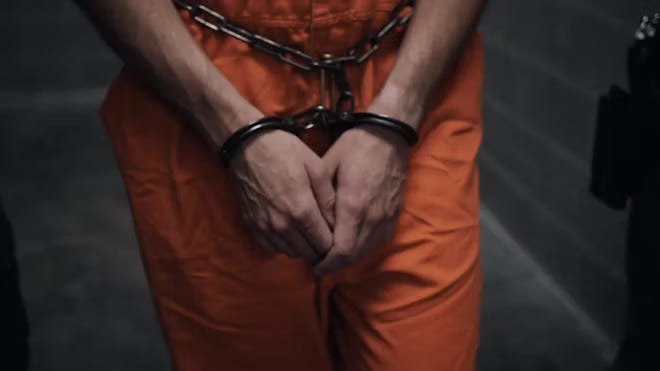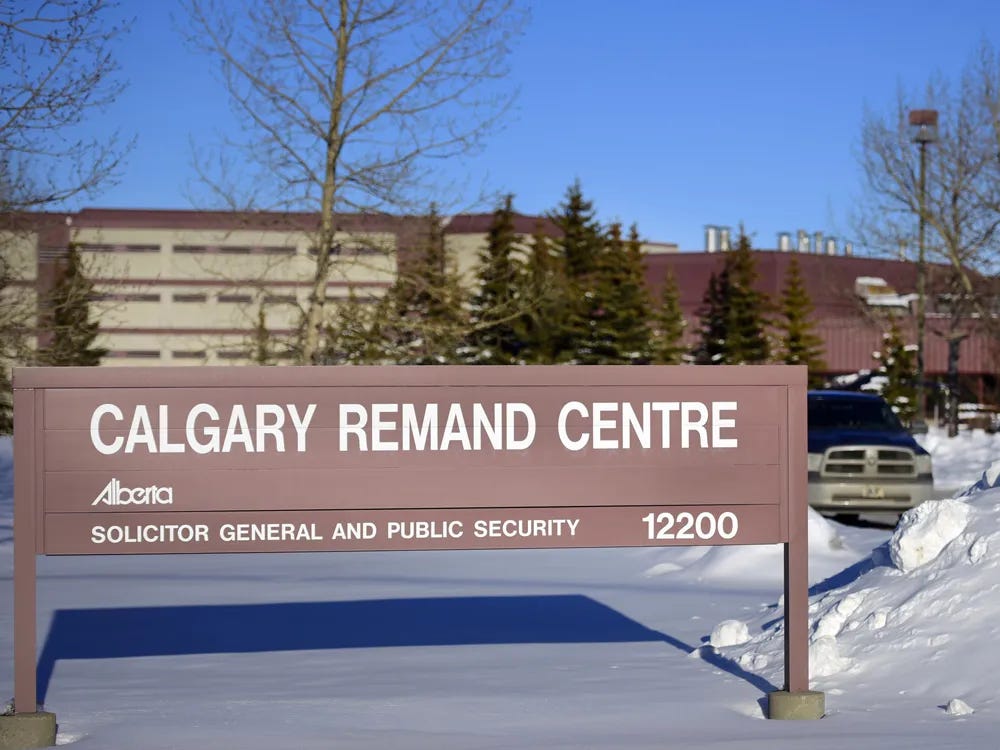Change of Venue Case Magnifies Court's Mistreatment of the Coutts Four
Accused murderer granted a change of venue due to hardships he would endure being held in an RCMP remand facility
A Supreme Court judge in B.C. recently ruled to have the murder trial for a defendant, Mitchell McIntyre, moved to a different venue to "prevent hardship on the defendant”. The defendant, 64 year old McIntyre is accused of second degree murder in the shooting death of Julia Howe, the common-law partner of his landlord in Creston, BC. The trial was originally set for Cranbrook, because its courthouse is closest to Creston, where the murder occurred and where most of the two dozen trial witnesses live.
Yet, Justice Paul Riley, deemed it necessary to move the trial to Kamloops, due to the substantial hardships McIntyre would face if he was moved from the Kamloops correctional centre, where he’s been in custody since his arrest, to jail facilities at Cranbrook’s RCMP Detachment for the duration of his trial. During his preliminary hearing McIntyre did have to travel to Cranbrook; a nine hour trip where he was shackled in leg irons and handcuffs in the back of a sheriff’s van. In Cranbrook he spent 18 days in a windowless jail cell at the RCMP detachment, where there were no recreational facilities and he was only allowed out of his cell to attend the pretrial and to have a shower. As a sheriff had to be on hand to monitor him while he showered he only had four showers during his 18 day stay. His meals consisted of frozen waffles for breakfast and reheated meat pies for dinner.
That was quite a contrast to Kamloops correctional centre where McIntyre had a cell with a window and two bunks all to himself, regular recreation time in the yard or in a gym, access to television and reading materials and a daily shower. Health care was also readily available to attend to his health problems which include heart issues, high blood pressure and psoriasis. McIntyre’s lawyers argued that the same hardships he faced during his preliminary hearing, including the trip itself, and the conditions he experienced at the RCMP Detachment’s facility, would undermine their client’s ability to participate in the trial proceedings and could impact the fairness of the trial. Justice Riley agreed, and granted the change of venue to Kamloops, so he could remain the the Kamloops facility. The move will also mean additional expenses of $24,000 to $35,000 to fly or drive all the witnesses to Kamloops for the trial. I am not saying it was wrong of the judge to grant this move to McIntyre, because an accused is innocent until proven guilty and should be treated humanely and have his rights respected.
What I am saying is that the hardships McIntyre endured at the Cranbrook RCMP Detachment for 18 days, pale in comparison to what four men endured in remand centres in Alberta, for two years, and counting. And I am talking about the Coutts Four – Jerry Morin, Chris Lysak, Chris Carbert, Tony Olienick – who were arrested and charged with conspiracy to commit murder of police as a result of a series of RCMP raids at the border blockade protest that took place in Coutts, Alberta, during the Freedom Convoy protest in Ottawa in February of 2022. They spent two years in remand custody, in conditions far worse than McIntyre’s 18 days in Cranbrook. Two of the men Jerry Morin, and Chris Lysak were released, just before their two year anniversary behind bars, as a result of plea deals involving much lesser charges that weren’t even in the original indictment, but that’s another story unto itself. The other two men, Carbert and Olienick, remain in custody still awaiting trial. What these men endured — conditions that the judges in their bail and pretrial hearings should have been well aware of — didn’t result in any type of change of venue or a change of heart for that matter. The men could only dream of being held in someplace like the Kamloops correctional centre like McIntyre.
Justice Riley thought it was a hardship for McIntyre to be transported to Cranbrook from Kamloops, shackled and handcuffed in the back of a sheriff’s van just once or twice. For the two years all four of these men were transported in such a manner countless times from their respective remand centres to the Lethbridge Courthouse for pretrial proceedings that sputtered along for months and months, started and stalled with constant adjournments. During these trips they were also shackled and often subjected to humiliating strip searches upon their arrival at the Lethbridge facility where they were often held in solitary confinement because as co-accused they could not share a cell. Olienick, on one occasion, following the adjournment of a pretrial hearing in Lethbridge, was not returned to the Medicine Hat Remand Centre, where he is normally held, for 18 straight days all of which he spent in solitary confinement at the Lethbridge facility. This occurred in December of 2023, and had it not been for supporters acting on Olienick’s behalf he could well have spent Christmas in solitary, in Lethbridge. Olienick, has spent at least 80 days in solitary confinement or segregation, over the course of his court appearances in Lethbridge, where he was locked up for up to 22 hours of the day, sometimes for as long as two weeks at a time.
During their stays in remand centres in Medicine Hat, Calgary and Lethbridge all four men have endured substandard medical care, received absolutely no mental health support, have had to put up with substandard food such as meals that are stale or cold, along with a callous disregard for their general well-being. They have no access to outdoor or indoor recreational facilities and have restricted access to their families. They often had to deal with overcrowding in their facilities with inmates being made to sleep on floors. Often while in custody the men were exposed to distressing and traumatic incidents such as witnessing drug addicts going through the pains of withdrawal or inmates with mental health challenges engaging in such behaviours as screaming for hours on end, and having hallucinations. Sleep is difficult if not impossible for these men in these situations.
Jerry Morin’s situation is unique and troubling. He was arrested some 12 hours after the other three men, and ultimately ended up in a Calgary remand centre where he was placed in a maximum security unit normally reserved for gang members. There he faced a potentially dangerous situation where he could suffer violent encounters with other inmates when he was in the general population. While incarcerated there he was denied visits with his common-law wife for a period of 19 months, and did not see his children who were 18, 13 and 10, until he was actually released from custody as a result of his plea deal. He spent close to 100 days in solitary confinement, not due to any bad behaviour on his part, but often for his own safety, because of where he was incarcerated.
Then there is Chris Lysak, a giant of a man; he is six foot five and has size 15 feet. During his incarceration he was not given the correct shoe size, so he had to cut off the toes of the shoes he was given in order to get his feet into them. The thin and old mattresses supplied at the remand centres were also not capable of supporting his large frame, yet he was not given an extra, or new mattress that could accommodate his weight and build.
Whereas McIntyre, in the Kamloops facility, has health care readily available to him to attend to his health problems, health care for all four men has been nothing short of a nightmare for them. Olienick suffers from Small Intestine Bacterial Overgrowth which requires a specific type of probiotic to manage it. He has been denied access to such a probiotic purely due to bureaucratic red tape and callous disregard for his health. Without the probiotics Olienick suffers considerable pain and discomfort, and often cannot eat what is given to him.
Chris Lysak suffered from severe pain in his knees and had been having injections to control it. He requested that he be allowed to have a follow up appointment with the doctor who had been treating him prior to his incarceration, but that request was denied. The facility doctor recommended that Lysak use a stationary bike as part of his rehabilitation for his knees, but the remand facility that housed him didn’t have a bike and weren’t particularly interested in getting him one. It was only through outside advocacy on the part of supporters that finally got him a bike. Since his release Lysak has been undergoing intensive physiotherapy to address many of the issues that arose with his physical health as a result of the conditions of his incarceration.
Chris Carbert had issues with a wisdom tooth that went on for several months before he was actually seen by a dentist. After the tooth was pulled a canker sore developed on his tongue resulting in his tongue becoming badly swollen and putting him in great pain. He asked for pain relievers or a numbing agent to help control the pain, but instead spent six days in unbearable pain where he could not speak or eat, before the swelling went away. Carbert also had a number of members of his family pass away while he was in custody including his father and brother. Carbert was not issued temporary leave to attend their services, though he would not have gone anyhow if he had to appear in chains and shackles. He was allowed to watch the live video of his brother’s funeral through arrangements made at his remand facility.
So it would seem that a B.C. Supreme Court Justice felt that an accused murderer would experience undue hardship if he was forced to spend a few weeks at an RCMP remand facility during his trial, but not a single judge in the country seems to care about the undue hardships the Coutts Four have endured for two long years at various remand centres in Alberta. Certainly not the trial judge or the judges they have appeared before for bail hearings, in which, of course, they were denied bail.
Something is terribly wrong with our justice system, which can only be described as completely lopsided and corrupt in terms of how certain prisoners are treated and others are mistreated and that mistreatment is completely ignored by authorities who have been well aware of it for sometime. I do not begrudge Mitchell McIntyre’s right to remain in a facility that can meet all of his needs during the course of his trial. But cases like McIntyre’s only magnify the fact something that something is terribly wrong with a justice system seems to have one set of rules for those facing charges for their association with the Freedom Convoy and another set of rules for everyone else. The Coutts Four are simply the most egregious example of this, which leaves one to wonder if there will ever be justice for the Coutts Four.












Nice work as always, Roxanne.
Thank you for this.
Thank you for making us aware of all of the hardships these men have had to endure. It breaks my heart what the Canadian Justice system has become.